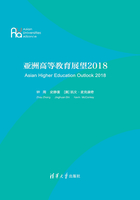
Chapter 3 Nature and Position of the AUA Members in Asia and the World
Higher education can be seen in terms of its contribution in supporting a country's internal processes, international relations, and sustainable economic development, as well as in the ongoing location and competition in the global market. Higher educationsystems and institutions in Asia are often aligned with national development plans, regional integration developments, and foreign relations policies.
The past two decades have seen a major shift in the role of higher education, especially in Asia, with many governments allocating greater education and higher educational resources to support socioeconomic development. From the long held human capital model to the increasing role of knowledge societies in advancement, shifts in market orientation in the higher education sector are apparent in the strategies and policies of many universities. In addition, university regional alliances that promise to strengthen and promote better access to and integration of higher education institutions exist across Asia.
To support the competitiveness of higher education systems in the global higher education market, various excellence initiatives have been established in several Asian countries including China (211, 985 and Double World Class), Japan (Top Global University Project), South Korea (Brain Korea 21), Malaysia (APEX and its Research Universities initiatives) and Thailand (World-class University Initiative). Similarly, Hong Kong and Kazakhstan have provided targeted funding for research and internationalization to increase visibility, competitiveness and attractiveness to international students, as well as to retain domestic students, in the global higher education market.
Members of AUA have registered greater international connectivity, impact, and reputation over the past two decades. Their achievements manifest the far-sighted commitment of their respective national governments and societies to supporting the development of world-class universities and academic fields and disciplines.
Internationalization together with institutional collaboration has focused on the exchange of academic materials, student and staff mobility, and joint research. The importance and impact of internationalization has been seen and acknowledged at multiple levels. Increased industry and government engagement in research and development functions especially in promoting knowledge and innovation and supporting national development plans is an emerging trend along with the social responsibility role of universities to address sustainable development, regional and global challenges.